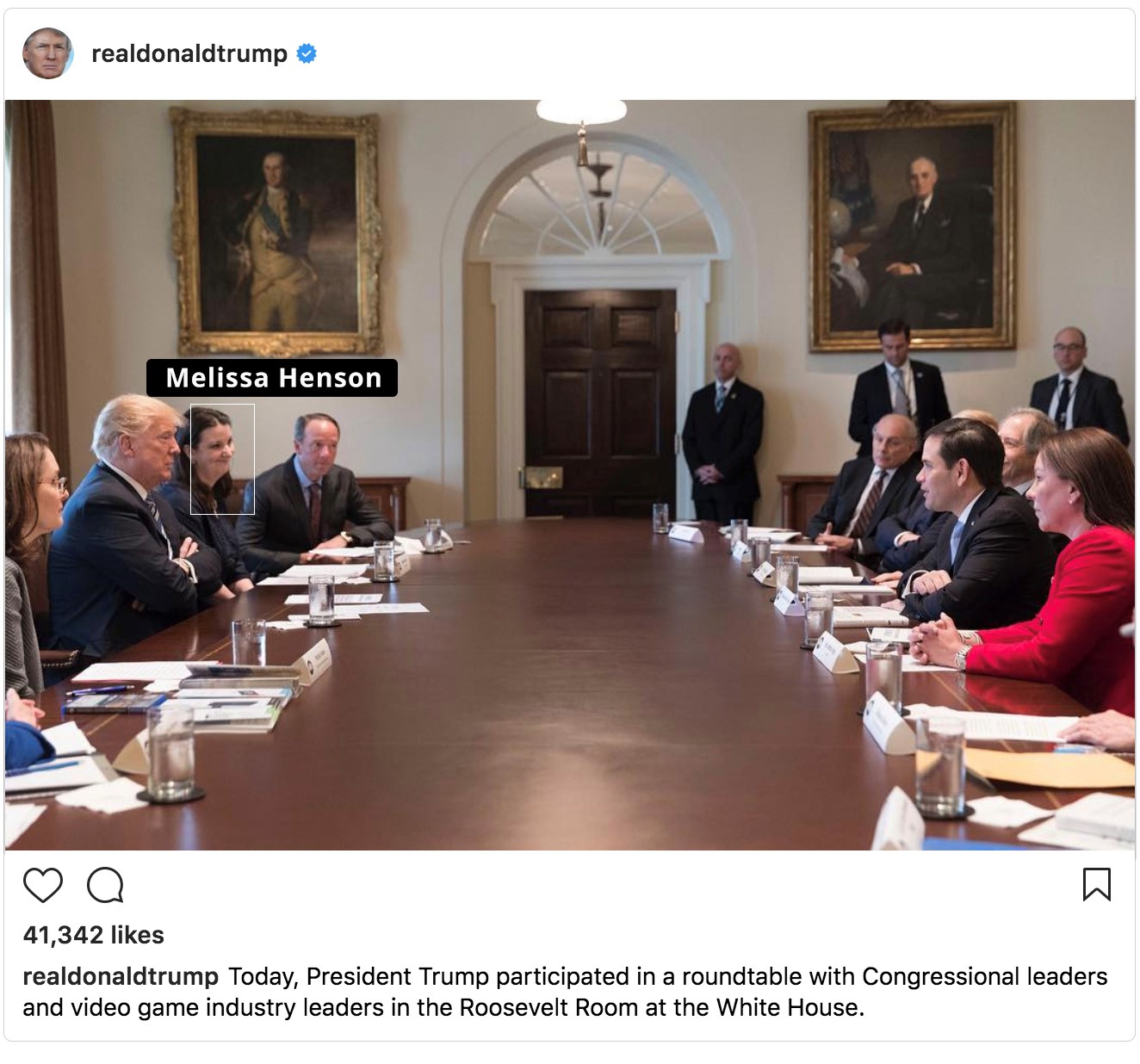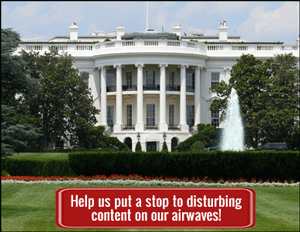- Because Our Children Are Watching
- Join the Cause
- Donate
Written by PTC | Published March 12, 2018
 The PTC’s Director of Programs, Melissa Henson, details her meeting at the White House with President Trump.
----------------
On Thursday, March 8th, I met at the White House with President Trump, other public policy experts on media violence, and representatives of the video game industry, regarding violent media and its impact on children.
The video game representatives pulled out their same old talking points that have long been refuted. During the meeting, I was able to interject and say just how untrue their excuses are.
The entertainment industry is still fighting to maintain the status quo and is not ready or willing to confront the impact that media violence has on our children. But the time is up for the entertainment industry to put a stop to marketing graphic, explicit, and age-inappropriate content to our children.
As a media analyst and advocate for more than twenty years, I’ve read nearly all the scientific papers on media’s impact on children. As the mother of a nine-year-old boy, I’ve experienced it firsthand, and I’ve seen how the deck is stacked against parents in our culture.
We are told to use the ratings. But those ratings are often misleading, or outright deceptive. The process by which the ratings are applied is secretive, those who administer them are accountable to nobody, and parents have no real recourse when they are misapplied.
The ESRB ratings are supposed to help keep violent video games out of the hands of children. Yet PTC research has revealed how easy it is for an unaccompanied minor to purchase an adult-rated video game; and the video game industry fought for the right of retailers – all the way to the Supreme Court – to sell violent video games to unaccompanied minors.
The academic community has warned us for over 60 years of the real-life impact of violent media content, yet in the five years since Newtown, TV violence has increased, substantially.
The PTC’s Director of Programs, Melissa Henson, details her meeting at the White House with President Trump.
----------------
On Thursday, March 8th, I met at the White House with President Trump, other public policy experts on media violence, and representatives of the video game industry, regarding violent media and its impact on children.
The video game representatives pulled out their same old talking points that have long been refuted. During the meeting, I was able to interject and say just how untrue their excuses are.
The entertainment industry is still fighting to maintain the status quo and is not ready or willing to confront the impact that media violence has on our children. But the time is up for the entertainment industry to put a stop to marketing graphic, explicit, and age-inappropriate content to our children.
As a media analyst and advocate for more than twenty years, I’ve read nearly all the scientific papers on media’s impact on children. As the mother of a nine-year-old boy, I’ve experienced it firsthand, and I’ve seen how the deck is stacked against parents in our culture.
We are told to use the ratings. But those ratings are often misleading, or outright deceptive. The process by which the ratings are applied is secretive, those who administer them are accountable to nobody, and parents have no real recourse when they are misapplied.
The ESRB ratings are supposed to help keep violent video games out of the hands of children. Yet PTC research has revealed how easy it is for an unaccompanied minor to purchase an adult-rated video game; and the video game industry fought for the right of retailers – all the way to the Supreme Court – to sell violent video games to unaccompanied minors.
The academic community has warned us for over 60 years of the real-life impact of violent media content, yet in the five years since Newtown, TV violence has increased, substantially.
 But that’s just the tip of the iceberg. I’ve seen how marketers foster feelings of social-isolation among children, boys in particular, by making them feel like if they aren’t playing video games, or if they don’t own a game system, they are different from ‘normal’ kids. I’ve seen how same-age-peers can act as the most effective marketers for the entertainment industry – and that there’s virtually no way to inoculate a child from the peer pressure to play these games; I’ve seen how the incentives and rewards systems built into these games can make even an occasional gamer, behave like an addict. I’ve seen how even supposedly child-friendly environments like Chuck-E-Cheese make violent video games accessible to children without limit or restriction.
I’ve also experienced, both professionally and personally, the near-constant parent-shaming perpetuated by the entertainment industry and its acolytes: If your child was more disciplined, if you were a better parent, if you’d only “do your job,” none of this would be a problem.
But there’s virtually no way to get away from the constant pressure on kids to “see this movie,” “watch that TV show,” “listen to that artist,” “play those games.” It’s everywhere. On the cereal boxes, the retail displays, the advertisements. Even the most diligent parent can’t completely shut it out, at least not without deepening a child’s sense of social isolation. It’s like a toxic gas. Even if you shut the doors and windows and seal the edges, it will still find a way to get in.
We appreciate President Trump’s willingness to confront media gun violence and its impact on our children, and we hope that today’s dialogue will be the starting point towards real change.
---------------------
Below is the video that President Trump presented to the participants at the beginning of the meeting.
WARNING: There are very graphic images of violence shown from various video games that children can have access to.
But that’s just the tip of the iceberg. I’ve seen how marketers foster feelings of social-isolation among children, boys in particular, by making them feel like if they aren’t playing video games, or if they don’t own a game system, they are different from ‘normal’ kids. I’ve seen how same-age-peers can act as the most effective marketers for the entertainment industry – and that there’s virtually no way to inoculate a child from the peer pressure to play these games; I’ve seen how the incentives and rewards systems built into these games can make even an occasional gamer, behave like an addict. I’ve seen how even supposedly child-friendly environments like Chuck-E-Cheese make violent video games accessible to children without limit or restriction.
I’ve also experienced, both professionally and personally, the near-constant parent-shaming perpetuated by the entertainment industry and its acolytes: If your child was more disciplined, if you were a better parent, if you’d only “do your job,” none of this would be a problem.
But there’s virtually no way to get away from the constant pressure on kids to “see this movie,” “watch that TV show,” “listen to that artist,” “play those games.” It’s everywhere. On the cereal boxes, the retail displays, the advertisements. Even the most diligent parent can’t completely shut it out, at least not without deepening a child’s sense of social isolation. It’s like a toxic gas. Even if you shut the doors and windows and seal the edges, it will still find a way to get in.
We appreciate President Trump’s willingness to confront media gun violence and its impact on our children, and we hope that today’s dialogue will be the starting point towards real change.
---------------------
Below is the video that President Trump presented to the participants at the beginning of the meeting.
WARNING: There are very graphic images of violence shown from various video games that children can have access to.